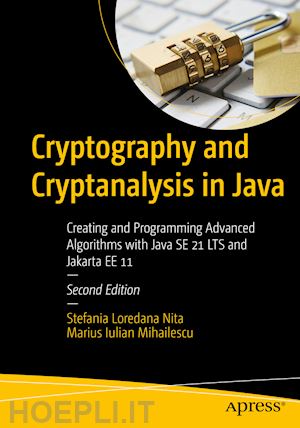
Questo prodotto usufruisce delle SPEDIZIONI GRATIS
selezionando l'opzione Corriere Veloce in fase di ordine.
Pagabile anche con Carta della cultura giovani e del merito, 18App Bonus Cultura e Carta del Docente
Here is your in-depth guide to cryptography and cryptanalysis in Java. This book includes challenging cryptographic solutions that are implemented in Java 21 and Jakarta EE 11. It provides a robust introduction to Java 21's new features and updates, a roadmap for Jakarta EE 11 security mechanisms, a unique presentation of the "hot points" (advantages and disadvantages) from the Java Cryptography Architecture (JCA), a new chapter on Quantum cryptography, and more.
The book dives into the classical simple cryptosystems that form the basis of modern cryptography, with fully working solutions (encryption/decryption operations). Pseudo-random generators are discussed as well as real-life implementations. Hash functions are covered along with practical cryptanalysis methods and attacks, asymmetric and symmetric encryption systems, signature and identification schemes.
The book wraps up with a presentation of lattice-based cryptography and the NTRU framework library. Modern encryption schemes for cloud and big data environments (homomorphic encryption and searchable encryption) also are included. After reading and using this book, you will be proficient with crypto algorithms and know how to apply them to problems you may encounter.
New to This Edition:
The modernized Second Edition is updated to reflect the latest language features in Java 21 and Jakarta 11, along with the introduction of a new chapter on Quantum Cryptography (Chapter 6).
What You Will Learn
Who This Book Is For
Those who want to learn and leverage cryptography and cryptanalysis using Java. Some prior Java and/or algorithm programming exposure is highly recommended.
1. Getting Started.- 2. JDK 21 Java New Features.- 3. The New Jakarta EE 11.- 4. Java Cryptography Architecture.- 5. Classical Cryptography.- 6. Quantum Cryptography.- 7. Formal Techniques for Cryptography.- 8. Pseudo-random Generators.- 9. Hash Functions.- 10. Symmetric Encryption Algorithms.- 11. Asymmetric Encryption Schemes.- 12. Advanced Encryption Schemes.- 13. Identification Schemes.- 14. Signature Schemes.- 15. Lattice based Cryptography and NTRU.- 16. Cryptography Tools.
Stefania Loredana Nita, PhD, is a Lecturer at “Ferdinand I” Military Technical Academy of Bucharest and a Software Developer and Researcher at the Institute for Computers. Her PhD thesis was on advanced cryptographic schemes using searchable encryption and homomorphic encryption. At the Military Technical Academy she teaches courses of Formal Languages and Translators and Database Application Development. She has worked more than two years as an Assistant Lecturer at the University of Bucharest where she taught courses on subjects such as Advanced Programming Techniques, Simulation Methods, and Operating Systems. Her research activity is in the cryptography field, with a focus on searchable encryption and homomorphic encryption. She is also interested in blockchain, quantum cryptography, machine learning, and artificial intelligence. At the Institute for Computers she is working on research and development projects that involve cloud computing security, the Internet of Things, and big data. She has authored and co-authored more than 28 papers at conferences and in journals and has co-authored five books. She holds an MSc degree in Software Engineering and two BSc degrees, with one in Computer Science and one in Mathematics.
Marius Iulian Mihailescu, PhD, has worked in academic and industry sectors for more than 15 years. Currently, he is an Associate Professor (Senior Lecturer) in the Faculty of Engineering and Computer Science at “Spiru Haret” University, Romania, and also has a side job as Project Manager at the Institute for Computers where he is managing projects using different technologies, such as DevOps, Scrum, Agile, C#, Microsoft SQL Server, Syncfusion, ASP.NET, and VUE. At the university he taught several key computer science courses, such as Information Security, Functional Programming, Internet of Things, Blockchain, Software Development Methods (Microsoft Azure, Entity Framework, NHibernate, Linq-to-SQL, UX with DevExpress controls, etc.), and Development Web Applications (HTML 5, CSS 3, Bootstrap, JavaScript, AJAX, nodeJS, VUE, Laravel, mRabbit, ASP.NET, PHP). He authored and co-authored more than 30 articles at conference proceedings, 25 articles in journals, and six books. For three years he worked as IT Officer at Royal Caribbean Cruises Ltd, where he dealt with IT infrastructure, data security, and satellite communication systems. He received his PhD in 2014 and his thesis was on applied cryptography over biometrics data. He holds two MSc degrees in Information Security and Software Engineering, from “Ferdinand I” Military Technical Academy and University of Bucharest, Romania.











Il sito utilizza cookie ed altri strumenti di tracciamento che raccolgono informazioni dal dispositivo dell’utente. Oltre ai cookie tecnici ed analitici aggregati, strettamente necessari per il funzionamento di questo sito web, previo consenso dell’utente possono essere installati cookie di profilazione e marketing e cookie dei social media. Cliccando su “Accetto tutti i cookie” saranno attivate tutte le categorie di cookie. Per accettare solo deterninate categorie di cookie, cliccare invece su “Impostazioni cookie”. Chiudendo il banner o continuando a navigare saranno installati solo cookie tecnici. Per maggiori dettagli, consultare la Cookie Policy.